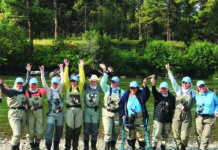Editor’s note: This story is modified from the Wilderness Cowboy chapter of the Farcountry Press book, “Heroes of the Bob Marshall Wilderness” by John Fraley
Joe Murphy began packing across the Bob in the early days, when the land in the upper South Fork of the Flathead was a collection of unofficial primitive areas, and the Wilderness Act was nearly a half-century into the future.
Joe was popular with dudes. His demeanor was quiet, and he was calm and competent. At six foot, two inches, he was an impressive man, and looked the part of a Wild West cowboy. He could handle stock like nobody else. People on his trips quickly saw that they could count on Joe to make good decisions and lead them on a safe trip far into the backcountry.
Joe and his outfit were nationally famous for the “Trail Riders of the Wilderness,” a large program that brought together dozens of riders, including many prominent people, for trips through the Bob and other wildernesses. These trips often spanned 12 days, and stretched from the Murphy Ranch to the Chinese Wall, and then out to Holland Lake. These important guests were inspired by the trips to support the wilderness.
The Murphy Ranch, offered a perfect jumping off point to the Bob country from the south. The ranch lay only a mile from Ovando, a tiny town with a population of “39 nice people.”
On one early trip in 1920, Joe hosted two dignitaries (Mac and P.D.) on a trip from his ranch into the Chinese Wall. The explored that country for days, then headed back down to the South Fork. The group woke up on a cold morning, with snow dusting the peaks around them. Joe urged them to an early start, and they reached their Salmon Forks base camp by 4 p.m. after a 20-mile ride.
Mac and P. D. wished to bring out some smoked fish, so the crew got serious. They fished up Big Salmon Creek and in the South Fork with good success. Joe fished downstream to the mouth of Little Salmon Creek and hit the jackpot with big cutthroat and even saw some bull trout. In fact, he saw one bull trout so large that it scared him. Joe said that he would not go swimming near Little Salmon “where that whale was” in fear of losing a leg. That evening, some of the horses decided that they liked the White River grass better than the feed at Salmon Forks. Joe had to travel about five miles to find them and wrangle them back to camp.
The next morning, Joe rounded up three saddlehorses and some bags to hold the fish. Bob (Joe’s younger brother) stayed in camp, keeping the fire going to smoke fish. Joe, Mac, and P. D. forded the river on horseback and fished their way down the rough banks, sometimes re-crossing the fast-flowing, clear river to reach better places to fish. At good river holes, the men dropped the reins on the ground and fished.
P. D.’s feet had been sore after all the wading they had done so after one stop, Mac announced to P. D. that he had a plan. “The next time we ford the river, I am going to fish from my horse in the middle of the stream. Why freeze our feet when the horses are willing. I will catch them and you stay on bank and land them.” P. D. said that it sounded like another theory that wouldn’t work.
Mac rode out into the river at the next crossing and at midstream, he stopped his horse, Bones, with the water lapping the stirrups. He cast out about thirty feet of line, and a one-and-a-half-pound cutthroat hit his fly. As he played the trout, he struggled to make sure it didn’t tangle up with the horse’s legs; he held the fishing rod and the saddle horn in one hand, and by leaning way over was able to net the fish with the short-handled net. Bones stuck its nose around to smell the fish and something set him off. Mac was startled, and “reined him in with the strong-arm bit, but he either went towards shore, walked on his hind legs, or backed up, all of which was appreciated by a man with a fly rod and a net with a fish in it in one hand, the reins in the other, and the extra fly on the leader flipping around. Mac’s fishing trick, for him, had turned into a rodeo, and it was no less entertaining for P. D. and Joe.
Meanwhile, enjoying great catch rates, P. D. fished in the center of the river from the back of “Monty” and landed five large trout in about twenty minutes. Joe rode back and forth from shore and loaded each trout in a bag on his saddlehorn. Mac struggled on Bones, and finally gave up on his own theory and fished from shore.
Joe left for camp about noon to join Bob and clean the fine catch of trout; they would salt them for smoking and keep the process going.
Mac and P. D. had to be feeling pretty good about the day. They had caught lots of big cutthroat trout, a treasure that would be smoked and preserved for packing out. They might never experience fishing this good again.
And, most importantly, the dudes had invented a new sport: trout wrangling.
After lunch, the two men decided to fish one more hour at the mouth of Little Salmon Creek. Mac made another cast and immediately hooked another pound-and-a-half trout. He started playing the trout and, suddenly, it went crazy.
The cutthroat raced from one side of the pool to the other. It raced toward shore, gaining speed as it approached the riffle of Little Salmon Creek. Then Mac saw the object of the cutthroat’s fear: a bull trout “at least three feet long” and swimming like a high-speed torpedo was within two feet of grabbing his cutthroat off his line. Mac called to P. D. to watch the “race for life.” The cutthroat kept just ahead of the bull, finally reached the shallows of the creek mouth, and “actually seemed pleased” to slide up the bank to safety.
The fishing had been great in the morning, but this truly was the best fishing an angler could ever experience, and they both must have known that it could never be equaled. They were enamored by the wilderness, and vowed to support it.
P. D. and Mac loaded the cleaned fish in bags on their saddles. Tired and sleepy, they started the three-mile ride back to camp.
Fraley’s books are available at Farcountrypress.com
Credit: Source link






























